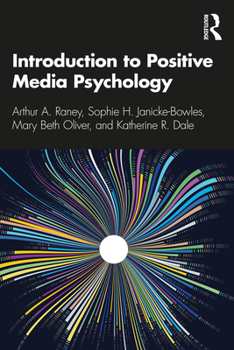Introduction to Positive Media Psychology
Select Format
Select Condition 
Book Overview
Introduction to Positive Media Psychology summarizes and synthesizes the key concepts, theories, and empirical findings on the positive emotional, cognitive, and behavioral effects of media use. In doing so, the book offers the first systematic overview of the emerging field of positive media psychology.
The authors draw on a growing body of scholarship that explores the positive sides of media use, including fostering one's own well-being; creating greater connectedness with others; cultivating compassion for those who may be oppressed or stigmatized; and motivating altruism and other prosocial actions. The authors explore these issues across the entire media landscape, examining the ways that varying content (e.g., entertainment, news) delivered through traditional (e.g., film, television) and more recent media technologies (e.g., social media, digital games, virtual reality) can enhance well-being and promote other positive outcomes in viewers and users.
This book serves as a benchmark of theory and research for current and future generations of advanced undergraduate students, graduate students, and scholars in communication, psychology, education, and social work.





